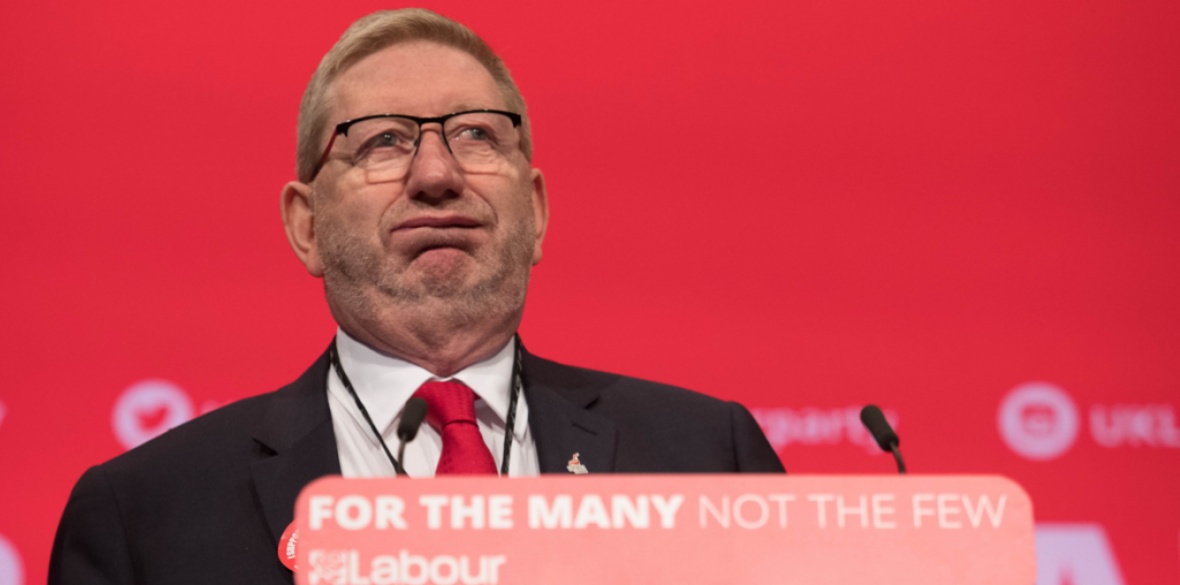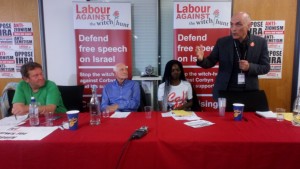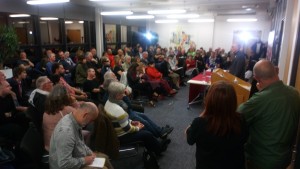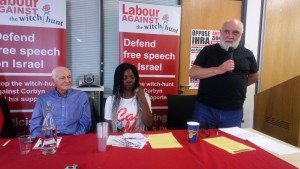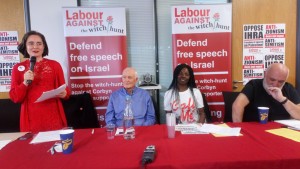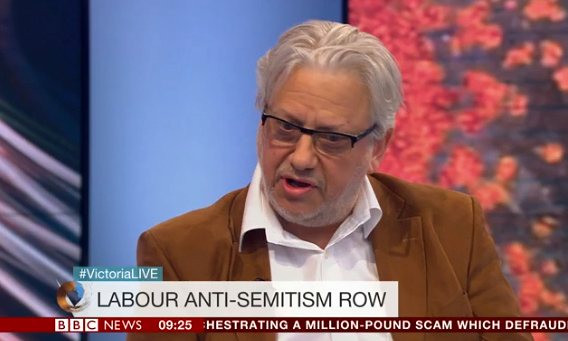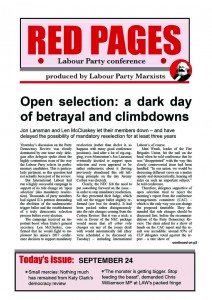
Red Pages, Monday September 23
Articles in today’s issue:
Open selection: a dark day of betrayal and climbdowns
Jon Lansman and Len McCluskey let their members down – and have
delayed the possibility of mandatory reselection for at least three years
Small mercies
What has happened to the NEC’s commitment to membership democracy?
“They can fuck off”
Alexei Sayle, Chris Williamson MP and others addressed Labour Against the Witchhunt’s fringe meeting last night
Read the PDF version here
Open selection: a dark day of betrayal and climbdowns
Jon Lansman and Len McCluskey let their members down – and have delayed the possibility of mandatory reselection for at least three years
Yesterday’s discussion on the Party Democracy Review was clearly dominated by one issue only: delegate after delegate spoke about the highly contentious issue of the way the Labour Party selects its parliamentary candidates. This is particularly pertinent, as this question had not actually been part of the review.
But International Labour had run a highly successful campaign in support of its rule change on ‘open selection’ (aka mandatory reselection). Thousands of party members had signed IL’s petition demanding the abolition of the undemocratic trigger ballot and the establishment of a truly democratic selection process before every election.
The campaign received an important boost when Unite’s general secretary, Len McCluskey, confirmed that he would fight to implementhis union’s 2017 conference decision to support mandatory reselection (rather than shelve it, as happens with many good conference positions). And after a lot of zig-zagging, even Momentum’s Jon Lansman eventually decided to support open selection and even appeared to be rather enthusiastic about it (having previously abandoned this old leftwing principle on the day Jeremy Corbyn was elected).
Clearly, the NEC felt the need to put somethingforward on the issue – in order to stop mandatory reselection. So they presented their fudge, which will see the trigger ballot slightly reformed (see box for details). It had been packed rather disingenuously into the rule changes coming from the Corbyn Review. But it was a trick: a vote in favour of the NEC package would mean that all other rule changeson any of the issues dealt with would automatically fall (they were scheduled o be discussed on Tuesday) – including International Labour’s, of course.
Matt Wrack, leader of the Fire Brigades Union, hit the nail on the head when he told conference that he was “disappointed” with the way this clearly controversial issue had been handled: “In our union, we would be discussing different views on a matter openly and democratically, hearing all sides on such an important subject,” he told conference.
Therefore, delegates supportive of open selection tried to reject the morning’s report from the conference arrangements committee (CAC) – which is the only way you can change the proposed timetable. They demanded that rule changes should be discussed first, before the recommendations of the Party Democracy Review. The chair asked for a show of hands on the CAC report and the result was incredible: around 95% of CLP delegates voted againstthe report – a rare show of unity. Then the unions were asked to vote and here the picture was the absolute opposite: no more than half a dozen delegates put their hand up against the report (mainly delegates from the FBU), but about 50 voted in favour. And because the whole union block counts for 50% of total conference voting, a card vote had to be called.
The result was incredibly close: 53.63% voted for the report; 46.37% against.
It turned out that Unite had instructed its delegates to vote in favourof the CAC report – despite their official commitment to open selection. At Unite’s meeting earlier in the morning, McCluskey had told his delegates to do so “on the request of Jeremy Corbyn, who asked for the support of the unions on this issue”. When pressed by angry delegates why the union had given up on its position, he told them it had not: Should the motion by International Labour reach conference floor, he said, Unite would instruct its delegates to vote infavourof it. In the meanwhile, he was clearly doing everything in his power to stop that.
Corbyn calls the NEC proposal an “affirmative ballot”. Howard Beckett, assistant general secretary of Unite, described it as “selective reselection”. But Pete Firmin, stalwart of the Labour Representation Committee, eloquently told conference that “A trigger ballot is a trigger ballot is a trigger ballot, no matter what you call it.” Quite right.
Having lost the CAC battle in the morning, supporters of open selection tried to mobilise delegates to vote against section 8 in the NEC proposals, which dealt with parliamentary candidates (as well as section 6, which contained the NEC fudge on leadership elections). Speaker after speaker got up to oppose section 8. As we go to press, we don’t know the outcome of the vote.
However, another change of heart by a certain Jon Lansman has dramatically reduced the chances of success on this matter. Midway through the debate, Lansman put out the following message to Momentum delegates:
“Momentum is supporting card vote 8 because it addresses one of the key flaws of the existing system. By separating the party branches from affiliates, it gives members the power to begin an open selection. It isn’t perfect, but it is a step forward and there is no guarantee any of the remaining rule changes on reselection will pass. Please support card vote 8. We may not get another chance to increase accountability of MPs.”
And from then on the speeches on conference floor shifted markedly. Most speakers were still supportive of open selection, but more and more often you heard phrases like ‘but a small step forward is better than the status quo’. And that despite the fact that news of McCluskey’s ‘tactic’ was spreading like wildfire: if conference voted to reject section 8, that would mean that IL’s motion would be tabled on Tuesday – and that Unite would instruct its delegates to vote in favour of it, making it almost a certain win.
This charade clearly shows not just how inept Lansman has become as a politician. Unfortunately, it also shows that Jeremy Corbyn – despite three long years in the crosshairs of the right in the PLP and the establishment – is still not prepared to do what is necessary to transform Labour into a real party of the working class. He is still being a conciliator – trying to appease the right and keep them as calm as possible, so that he can become prime minister.
And here’s the crux of the matter: even if Labour wins the next general election, the rightwing PLP has proved that they will not simply subordinate themselves to Corbyn. They will make his life hell at every opportunity. They are very likely to launch another no-confidence vote against him – he will, in effect, be unable to govern. The only way to avoid that, of course, would have been the implementation of mandatory reselection to get rid of the plotters and saboteurs.
The NEC’s rule change: very slight improvement
Currently, it is almost impossible to get rid of a sitting MP. If s/he wants to stand again, the ‘trigger ballot’ process begins. All the constituency’s branches and its affiliates (trade unions, socialist societies, cooperative organisations) have one vote eachand can choose ‘yes’ or ‘no’ to retaining the sitting MP as the only candidate. Each branch and affiliate is counted equally, irrespective of the number of members. Unless 50% of those vote ‘no’, the sitting MP automatically becomes the parliamentary candidate.
The NEC proposal seeks to replace the current trigger ballot with two separate ones: the first for local affiliated bodies like unions; and the second for the local Labour Party branches. The threshold in both would be reduced from the current 50% to 33% and it would be enough for one of the two sectionsto vote ‘no’ to start a full selection process – ie, a contest between the different candidates.
Incidentally, it has only now transpired that the NEC’s proposal would notmean that branches would have to achieve the 25% quorum stipulated in the rule book in order to be counted towards the 33% needed for the trigger ballot (which many had feared). In fact, the NEC proposes to keep the quorum of 25% only for AGMs, but reduce the quorum for “ordinary meetings” to 5% – or 75 members (whichever is lower).
The NEC’s proposal is therefore indeed a small step forward. It will remove the potential of union branches to keep a rightwinger in place despite the expressed wish of the local membership. But it is still far from what is needed to hold our MPs properly to account and to get rid of the saboteurs in the PLP, who have been plotting against Corbyn from day one.
Small mercies
What has happened to the NEC’s commitment to membership democracy?
Yesterday the NEC finally released its proposals for constitutional rule changes coming out of the Party Democracy Review – seven hours before conference was expected to approve them! This process makes a laughing stock of our democracy – how on earth are delegates supposed to give serious consideration to such proposals (even excluding the fact that the membership as a whole is totally excluded from the process)?
Yesterday the NEC’s statement on the Party Democracy Review was carried on a show of hands, by the way, despite much opposition being expressed to the way the NEC had agreed to dilute its original positive proposals.
And within the proposed changes themselves, there is very little that can be said to enhance democracy in any way. For example, under ‘Membership rights’ it now states that members have “the right to dignity and respect”, and that party officers must “use their best endeavours to ensure procedural fairness”. But, of course, members are not guaranteed the right to free speech – particularly on Israel/Palestine – thanks to the NEC’s acceptance of the International Holocaust Remembrance Alliance so-called definition of ‘anti-Semitism’. How does that ensure their “right to dignity and respect”?
We mentioned yesterday the proposed rule change under which the National Constitutional Committee – which deals with disciplinary questions passed on to it by the NEC – is to be expanded from 11 to 25 members. Perhaps this was originally intended as a means of changing the political balance on the NCC in favour of the Corbyn leadership, but the method by which NCC members will be elected is totally and utterly unclear. The proposed rule change begins by stating that the 14 additional members will be elected “at, or as soon as practicable after”, the 2018 conference. But it contains no recommendations on this, so will the chair ask delegates today, once the rule change is carried, if they now wish to nominate and vote for those extra members?! It is more likely that an alternative method will later be imposed by the NEC (perhaps a “one-member-one vote postal ballot”, which is listed as an option). What a shambles.
It is true that under the new rules the NCC will be obliged to “ensure that the charges are determined without undue delay and in a manner that is fair to both the individual and the party”; and that “a disciplinary matter against an individual is to be determined within three months of the NCC receiving the charges”. But we are still left with a body capable of taking arbitrary decisions aimed against the current leadership by witch-hunting the left.
As we also reported yesterday, the category of “contemporary motions” at annual conference is, thankfully, to be abolished. Previously the word “contemporary” has been used to automatically reject motions which were considered to overlap with reports from the NEC or National Policy Forum. Instead, CLPs will be able to submit motions to conference on any issue they choose and they do not have to continue to scramble around for ‘recent’ studies or articles to justify their submission.
But the NEC will still be able to stop discussion of proposals that ‘infringe’ on its territory. For example, the fact that the NEC’s decision to “review membership rates and discounts” is categorised as a rule change (which will “expire” at the 2019 conference!) means that the motion from Tewkesbury, calling for 50% of members’ dues to be returned to CLPs, automatically falls.
The NEC also wants to set up “equalities branches” – to be made up exclusively by women, BAME or disabled comrades! This is absurd. Why should there be separate local branches (presumably covering the whole of a constituency) for such comrades? Surely they should be organised alongside all other members – while, of course, having the right to come together in caucuses, if they so wish.
The NEC also wants to run “pilots” to allow “electronic attendance” and “online voting” locally to look into ways of “maximising participation”. As we stated yesterday, this is a retrograde step. Decisions should be taken by members who are fully informed and aware of the issues at stake – and in that sense it is positive that in another proposed change CLP executives will be obliged to “report all decisions in writing to the CLP general meeting for approval”.
We were wrong yesterday, by the way, when we stated that the rule changes would include a move to transform all CLP general committees into all-members meetings. In fact, this question is to be left to the CLPs themselves to decide.
But we were correct when we wrote that there would now be a “realistic quorum” for CLPs – it has been lowered from 25% to 5% under the NEC’s proposals, at least for ‘ordinary meetings’. I suppose we should be grateful for small mercies!
“They can fuck off”
Alexei Sayle, Chris Williamson MP and others addressed Labour Against the Witchhunt’s fringe meeting last night
“There can be no greater injustice than anti-racists being accused of racism by racists.” Scouse comedian Alexie Sayle travelled up from London especially to deliver this common-sense condemnation of the fake anti-Semitism smear campaign against Corbyn and the Labour left to Labour Against the Witchhunt’s packed Labour conference fringe meeting last night. The potential for “massive transformation” opened up by “the miracle of Jeremy Corbyn” had overcome Alexei´s longstanding abstention from voting, but he had not (yet?) joined the party, to maintain his ‘independence’ as a comedian. The witch-hunters can’t expel a non-member, he said, “so they can fuck off!”
Jewish Voice for Labour’s Jo Bird, newly elected as a councillor in Birkenhead, pointed out that in her election campaign “no-one raised anti-Semitism on the door”. She was appalled at the way neighbouring MP Frank Field had used accusations of anti-Semitism and bullying. To all those falsely suspended and expelled she said: “You are owed a huge apology. On behalf of the party, I am very sorry.” That moving apology was made particularly poignant when 73-year-old Bob Walker, the youngest of the ‘Garston 3’, described how the three pensioners were expelled for merely attending a meeting of the Trade Unionist and Socialist Coalition.
Ex-Liverpool councillor Tony Mulhearn called on Corbyn and McDonnell to stand up to the witch-hunters: “No more apologies, no more retreats. When you apologise, you are accepting you did something wrong.” Recalling the “ridiculously long list of charges” he faced in his own expulsion in 1986, “a witch-hunt is irrational”, he said, “because the decision has already been made”. At that time John McDonnell had stood firm in his defence, but now he is saying: “We need to be conciliatory; we are a broad church.” As Tony Greenstein commented, “Even the broadest church does not expel atheists. The ‘atheists’ in our party are not, and never have been, socialists.”
Chris Williamson MP, confronting the IHRA definition of anti-Semitism adopted by the party, confessed that he often describes Israel as an apartheid state, and compared Israel´s treatment of the Palestinians to the fate of the Cherokees in America. Denouncing the “terrible injustice” being done to Jackie Walker, he condemned the way Marc Wadsworth had been “demonised as a bigot” for “asking a question at a press conference”.
All in all, this first ever Labour fringe meeting organised by LAW was a tremendous success.
